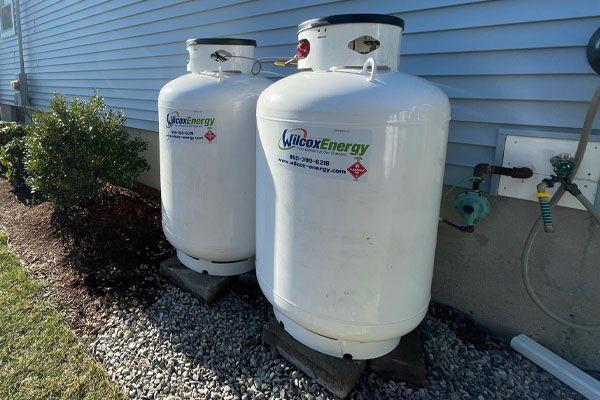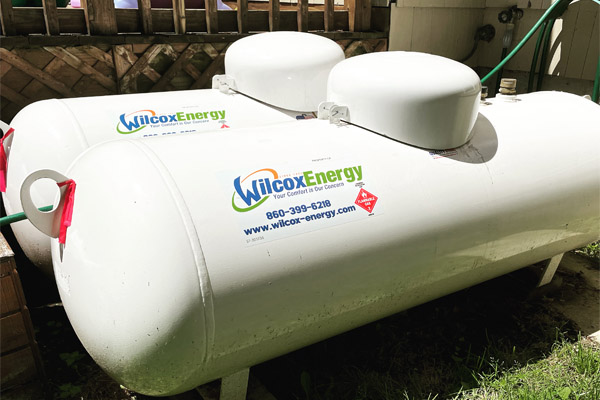Contents
- 1 Understanding Propane & its Properties
- 2 Effects of High Temperatures on Propane Behavior
- 3 Summer Propane Tips FAQs
- 3.1 How Does High Summer Heat Affect Propane in Tanks?
- 3.2 What Precautions Should I Take to Protect My Propane Tank During Hot Weather?
- 3.3 How Can I Identify Signs of Propane Leakage or Overpressure Conditions?
- 3.4 What Tasks Should Be Performed on Propane Tanks During Hot Weather?
- 3.5 Are There Any Environmental Concerns Associated with Propane Leaks During High Summer Temperatures?
- 4 Conclusion
- 5 Call Wilcox Energy For Superior Propane Services

Propane, a colorless and odorless gas, plays a pivotal role in daily life, from residential heating and cooking to powering outdoor activities such as grilling and camping. Its efficiency and versatility have made it a popular choice among consumers worldwide. However, external factors, such as high summer temperatures, or propane summer heat, can significantly influence its storage and effectiveness.
In this article by Wilcox Energy, we delve into propane’s multifaceted applications and examine how soaring temperatures during the summer months can affect propane storage, stability, and overall performance. Understanding these effects is crucial for consumers and industries reliant on propane, as it enables us to mitigate potential risks better and ensure the continued efficiency of this essential resource.
Understanding Propane & its Properties
Propane, a liquefied petroleum gas (LPG) with the chemical composition C3H8, is highly flammable and has a distinct odor for leak detection. Its clean-burning properties make it popular for residential heating and cooking, offering efficient energy production and precise temperature control.
However, due to its flammability, safe handling and storage practices are vital. Proper ventilation and maintenance of propane tanks are necessary to prevent accidents. Understanding these safety protocols is crucial for mitigating risks associated with propane usage.
Effects of High Temperatures on Propane Behavior

High summer temperatures, or propane summer heat, can significantly impact propane’s behavior, primarily due to its sensitivity to heat. As it is in its liquid state under pressure in tanks, the propane has a boiling point of approximately -44 degrees Fahrenheit (-42 degrees Celsius).
When exposed to higher temperatures, such as those experienced during summer, the liquid propane within the tank vaporizes and expands.
High temperatures cause liquid propane molecules to vaporize and expand, increasing tank pressure and risking over-pressurization, which can lead to leaks or ruptures. Heatwaves exacerbate this risk, especially with direct sunlight or poor ventilation, accelerating vaporization and pressure buildup.
Implementing safety measures like regular inspections, proper ventilation, and shaded storage areas is crucial to mitigate these dangers, ensuring safe propane storage and usage even in hot summer conditions.
Let Wilcox Energy handle your propane needs. Call us today for hassle-free propane delivery and exceptional service.
Safety Concerns & Precautions for Propane Tanks
Proper ventilation and temperature control for propane tank storage are vital for safety, dispersing heat, and preventing pressure buildup when dealing with propane summer heat.
Tanks should be positioned in well-ventilated areas away from sunlight and heat sources, especially in hot weather. Regular inspections for damage, along with temperature monitoring, are essential.
Address any leaks or unusual smells promptly and follow emergency protocols if needed. By prioritizing safety measures, homeowners can effectively mitigate risks associated with propane tanks in hot weather.
Need a refill? Trust Wilcox Energy for fast and convenient propane delivery whenever you need it. Call us today!
Preventive Maintenance & Inspection of Propane Tanks

Preventive maintenance and inspection of propane tanks are essential practices to ensure safety and efficiency. Below are some tips you can follow:
- Regular Propane Tank Inspection: Routine inspections of propane tanks and associated equipment are crucial to ensure their proper functioning and safety.
- Check for Propane Tank Corrosion & Damage: Regularly inspect propane tanks for signs of corrosion, damage, or wear that could compromise their integrity and lead to potential hazards. Ensure you promptly address any rust, dents, or leaks to prevent possible risks.
- Recommended Maintenance Schedules: Establish a service schedule for propane tank systems, including pressure checks, safety mechanism testing, and valve functionality verification.
- Proper Propane Tank Storage: Follow proper handling and storage procedures to minimize the risk of propane accidents or leaks.
- Consultation with Wilcox Energy: For comprehensive inspection and servicing of propane tanks, it’s advisable to consult with a professional such as Wilcox Energy. Their expertise ensures adherence to industry standards and enhances the safety and longevity of propane tank systems.
Don’t run out of propane gas! Call Wilcox Energy today for prompt propane delivery to your doorstep.
Environmental Impact & Regulatory Compliance
Adherence to regulatory requirements and best practices for propane storage and handling is crucial to minimize propane summer heat risks and ensure your safety. Compliance with regulations safeguards the environment and promotes responsible usage of propane resources.
Moreover, advancements in tank design and the development of eco-friendly propane solutions contribute to improved safety and sustainability in the industry.
By embracing these innovations and adhering to regulatory standards, stakeholders can mitigate environmental impact while ensuring propane’s efficient and responsible utilization.
Summer Propane Tips FAQs

As we navigate the challenges of managing propane during the sweltering summer heat, it’s crucial to understand common concerns and precautions. Here are some frequently asked questions (FAQs) to guide you in ensuring the safe and efficient usage of propane during this season:
How Does High Summer Heat Affect Propane in Tanks?
During high summer temperatures, propane stored in tanks can vaporize and expand due to heat exposure. Initially, in liquid form under pressure, propane undergoes vaporization and transitions into gas when temperatures rise.
This process causes an increase in pressure within the tank, which can exceed safe levels, potentially leading to over-pressurization or even tank rupture. Therefore, monitoring and regulating temperature and pressure levels within the tank, particularly during hot weather, are crucial for ensuring safe storage and usage of propane.
What Precautions Should I Take to Protect My Propane Tank During Hot Weather?
Prioritize ventilation and temperature control to protect your propane tank in hot weather. Ensure airflow to prevent pressure buildup and shield the tank from direct sunlight.
Regular inspections for damage should be conducted, and a pressure relief valve should be considered. Following manufacturer guidelines ensures safety and longevity.
How Can I Identify Signs of Propane Leakage or Overpressure Conditions?
Identifying signs of propane leakage or overpressure conditions is crucial for safety. Detecting the smell of gas, hearing hissing sounds, or observing dead vegetation near the tank are common indicators of leakage. Overpressure conditions may also cause bulging or distortion in tank walls. If suspected, evacuate the area immediately and contact emergency services. Regular tank inspections for damage or abnormalities are essential for early detection and prevention of hazards.
What Tasks Should Be Performed on Propane Tanks During Hot Weather?
During hot weather, it is essential to inspect the tank for signs of corrosion, dents, or damage that could compromise its integrity. Additionally, it is crucial to check the safety valves and pressure relief devices to ensure they are in proper working order.
Are There Any Environmental Concerns Associated with Propane Leaks During High Summer Temperatures?
Yes, propane leaks during high summer temperatures can pose significant environmental concerns. Propane is a greenhouse gas, and its release into the atmosphere contributes to air pollution and can exacerbate climate change. Additionally, propane leaks have the potential to contaminate soil and water sources, posing risks to ecosystems and human health.
Conclusion
High summer temperatures can significantly affect propane and propane tank storage, leading to risks such as over-pressurization and potential leaks. To mitigate these risks, proactive measures such as ensuring proper ventilation, regular inspections, and adherence to safety guidelines are paramount.
By prioritizing safety and implementing preventive measures, homeowners can guarantee the safe handling and storage of propane during hot weather conditions. Wilcox Energy remains dedicated to safety, reliability, and customer satisfaction in propane services, underscoring their commitment to delivering exceptional service while prioritizing the well-being of their customers and the environment.
Call Wilcox Energy For Superior Propane Services
When you need an excellent propane delivery service or propane heating services on the southern shoreline of Connecticut, contact Wilcox Energy. We offer high-quality propane heating system services and fuel deliveries that are fast, affordable, and friendly.
You can count on us to provide you with unbeatable service – each and every time. Give us a call today to discuss our different delivery plans and financing options. By working with us, you can customize your deliveries to meet your needs. Call now!
We also offer a full line of HVAC services to enhance your home’s comfort, indoor air quality, and energy efficiency. Some of the services that we offer include heating and cooling tune-ups, repairs, installations, and much, much more. Call Wilcox Energy now!
For more information about our propane deliveries or HVAC services, contact Wilcox Energy. You can click here to contact us, or you can call us at (860) 399-6218. We offer a full line of affordable and trusted home comfort services. Click the link to view our propane service area.

Related Articles:
- Understanding Propane: A Comprehensive Guide for Beginners
- Propane Myths Busted: Separating Fact from Fiction
- Dive into Warmth: The Benefits of Propane Pool Heating Systems
- 10 Things You Might Not Know About Propane Gas
- Tips On Cooking With Propane
- Why Use Propane For Your Standby Generator?
- Why More Homeowners Are Choosing Propane For Their Energy Needs
